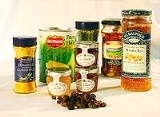
Food preservation
Overview
Food preservation is the process of treating and handling food
to stop or slow down spoilage
(loss of quality, edibility or nutritional value) and thus allow for longer storage
.
Preservation usually involves preventing the growth of bacteria, yeast
s, fungi
, and other micro-organisms
(although some methods work by introducing benign bacteria
, or fungi to the food), as well as retarding the oxidation
of fat
s which cause rancidity
.
Food
Food is any substance consumed to provide nutritional support for the body. It is usually of plant or animal origin, and contains essential nutrients, such as carbohydrates, fats, proteins, vitamins, or minerals...
to stop or slow down spoilage
Food spoilage
Spoilage is the process in which food deteriorates to the point in which it is not edible to humans or its quality of edibility becomes reduced. Various external forces are responsible for the spoilage of food. Food that is capable of spoiling is referred to as perishable food.-Reasons:Harvested...
(loss of quality, edibility or nutritional value) and thus allow for longer storage
Food storage
Food storage is both a traditional domestic skill and is important industrially. Food is stored by almost every human society and by many animals...
.
Preservation usually involves preventing the growth of bacteria, yeast
Yeast
Yeasts are eukaryotic micro-organisms classified in the kingdom Fungi, with 1,500 species currently described estimated to be only 1% of all fungal species. Most reproduce asexually by mitosis, and many do so by an asymmetric division process called budding...
s, fungi
Fungus
A fungus is a member of a large group of eukaryotic organisms that includes microorganisms such as yeasts and molds , as well as the more familiar mushrooms. These organisms are classified as a kingdom, Fungi, which is separate from plants, animals, and bacteria...
, and other micro-organisms
Microorganism
A microorganism or microbe is a microscopic organism that comprises either a single cell , cell clusters, or no cell at all...
(although some methods work by introducing benign bacteria
Bacteria
Bacteria are a large domain of prokaryotic microorganisms. Typically a few micrometres in length, bacteria have a wide range of shapes, ranging from spheres to rods and spirals...
, or fungi to the food), as well as retarding the oxidation
Redox
Redox reactions describe all chemical reactions in which atoms have their oxidation state changed....
of fat
Fat
Fats consist of a wide group of compounds that are generally soluble in organic solvents and generally insoluble in water. Chemically, fats are triglycerides, triesters of glycerol and any of several fatty acids. Fats may be either solid or liquid at room temperature, depending on their structure...
s which cause rancidity
Rancidification
Rancidification is the chemical decomposition of fats, oils and other lipids . When these processes occur in food, undesirable odors and flavors can result. In some cases, however, the flavors can be desirable . In processed meats, these flavors are collectively known as "warmed over flavor"...
.
Unanswered Questions

